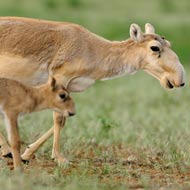
More than 120,000 saiga found dead since mid-May
A mass die-off has halved Kazakhstan's population of critically endangered saiga antelopes. So far over 120,000 animals have been confirmed dead since mid-May this year.
Experts say it is a major blow to the conservation of the species, which has only just begun to recover from a previous collapse in numbers, reducing the global population to less than 50,000 animals.
The die-off is said to have begun on 10 May, when the Association for the Conservation of Biodiversity of Kazakhstan (ACBK) went to the Betpak-Dala region of central Kazakhstan to monitor saiga calving. At that time a few hundred animals were dead, but the figure jumped to over 60,000 in just eight days.
More than 120,000 have now been confirmed dead, roughly half the previous population of more than 250,000, which was recorded earlier this year.
“This loss is a huge blow for saiga conservation in Kazakhstan and in the world, given that 90 per cent of the global saiga population is found in our country," said Erlan Nysynbaev, vice minister of Kazakhstan's Ministry of Agriculture. "It is very painful to witness this mass mortality."
An emergency mission to help solve the mysterious deaths included ACBK, the Ministry of Agriculture's Forestry and Wildlife Committee and international experts from the UK's Royal Veterinary College and Frankfurt Zoological Society (FZS).
So far, it is thought Pasteurella and Clostridia may have contributed to the die-offs, however these are only fatal to animals with weakened immune systems, so scientists continue to search for the fundamental drivers.
Other known syndromes are haemolytic septicaemia, which affects buffalo, and epizootic hemorrhagic disease. However, it could be something entirely new, according to experts from the Convention on the Conservation of Migratory Species of Wild Animals (CMS), who also despatched a team to the emergency mission.
Sadly mass die-offs are not uncommon in saiga, though previously these have been on a much smaller scale. In 2010, for example, 12,000 saiga were found dead in western Kazakhstan. The scale of the latest die-off is unprecedented, according to CMS.
Results of laboratory analysis are expected to shed light on the mass deaths in several weeks' time. FZS said in a statement it is "very likely" it will be possible to determine the cause of the deaths.
CMS executive secretary, Bradnee Chambers added: "Our hope is that if we can control what is driving these mass mortality events as well as tackle the number one threat to saigas – wildlife crime and poaching – populations will be able to recover. Collaboration among all stakeholders is vital."
Image: CC BY 2.0/USFWS Headquarters/http://www.flickr.com/photos/usfwshq/6383856545/Wikipedia Creative Commons



 The Veterinary Medicines Directorate (VMD) is inviting applications from veterinary students to attend a one-week extramural studies (EMS) placement in July 2026.
The Veterinary Medicines Directorate (VMD) is inviting applications from veterinary students to attend a one-week extramural studies (EMS) placement in July 2026.